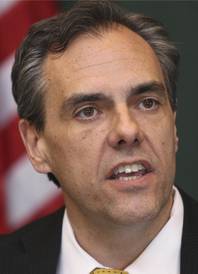Published Tuesday, March 22, 2016 | 11:56 a.m.
Updated Tuesday, March 22, 2016 | 1:14 p.m.

Dale Erquiaga
A controversial decision increasing costs for rooftop solar customers loomed over the first meeting of a task force charged with recommending a long-term plan for clean energy in Nevada.
Convened at the request of Gov. Brian Sandoval, the panel of energy executives, administration officials and lawmakers could offer possible legislation to encourage a modern electric grid.
But one of the timeliest concerns facing the task force is how the state should move forward in the wake of a Public Utilities Commission decision that increased bills for solar customers.
The ruling, which will be implemented over the next 12 years, increases a fee for customers and slashes the value of credits earned for generating excess electricity under a program known as net metering.
The ruling was criticized by solar advocates and investors, with two major rooftop solar companies — SolarCity and Sunrun — rolling back operations in Nevada and laying off employees.
An aide representing the governor’s office conceded that the criticism, whether merited or not, has damaged the state’s reputation in clean and renewable energy development.
“We would like your advice on how we move beyond that,” Dale Erquiaga, an aide to the governor, told the 12-member task force.
The governor has criticized the ruling for not grandfathering existing customers under old rates. He instructed the task force to consider how the state might be able to address that issue.
He also said the commission should probe what data regulatory bodies like the PUC rely on for their rate calculations.
Anne-Marie Cuneo, the director of regulatory operations for the PUC, said the ruling fulfilled a legislative mandate to avoid the unreasonable shifting of costs from solar customers to other ratepayers. In its final decision, the commission said rooftop solar customers avoided paying for their use of the grid and some of the utility’s fixed fees.
The commission decided not to grandfather customers because it wanted to avoid treating solar customers differently, Cuneo said.
In a conference call with reporters Monday, Rebecca Wagner, a former Nevada utilities regulator, said she had a different interpretation of the commission’s legislative mandate on the solar issue. She said the task force could propose a “hard reset” to net metering policy, especially concerning grandfathering.
Despite the focus on net metering, the task force’s mandate is much broader.
Its goal is to advise on policy for a modern and more renewable electricity grid, a push that coincides with several national efforts.
Energy experts believe policy will need to adjust in coming years to accommodate customers who adopt new technologies, such as home battery storage, charging stations for electric cars and rooftop solar, that are tied to the grid.
Earlier this year, Sandoval joined 16 governors in backing an accord that advocates for diverse power resources, clean transportation and modernizing the grid infrastructure.
Erquiaga described the accord as a “guiding source.” The task force, which has until June 1 to suggest legislation and until Sept. 30 to offer recommendations, will also consider the state’s energy portfolio, especially in light of the Clean Power Plan, a federal rule to decrease carbon dioxide emissions.
Although implementation of the rule is on hold pending several judicial challenges, state officials say Nevada is on track to meet its standards. In a presentation, an NV Energy official said the state sources about 10 percent of its energy from coal, 68 percent from natural gas and 22 percent from renewable sources.
Natural gas emits about half as much carbon dioxide as coal. NV Energy is slated to close its coal-fueled Reid Gardner Power Plant after 2017, which is expected to reduce carbon emissions.
“You will see that coal number drop as we move forward,” said Starla Lacy, an executive with NV Energy who is on the task force.
Today, the task force formed three break-off committees to study three issues: clean energy, grid modernization and policies concerning user-generated power options like rooftop solar. Those groups will include stakeholders from outside of the task force’s core membership, including representatives from environmental groups like the Sierra Club and companies like Tesla.
At the next meeting in May, each break-off committee is expected to propose bill drafts to the task force, which it could forward to the governor. The energy task force was last convened in 2011.

Join the Discussion:
Check this out for a full explanation of our conversion to the LiveFyre commenting system and instructions on how to sign up for an account.
Full comments policy